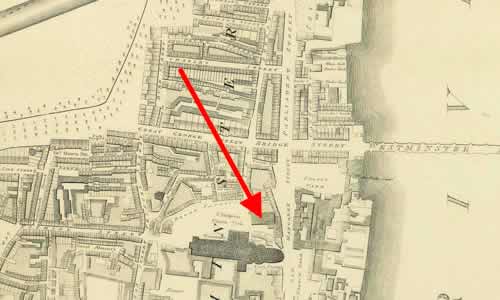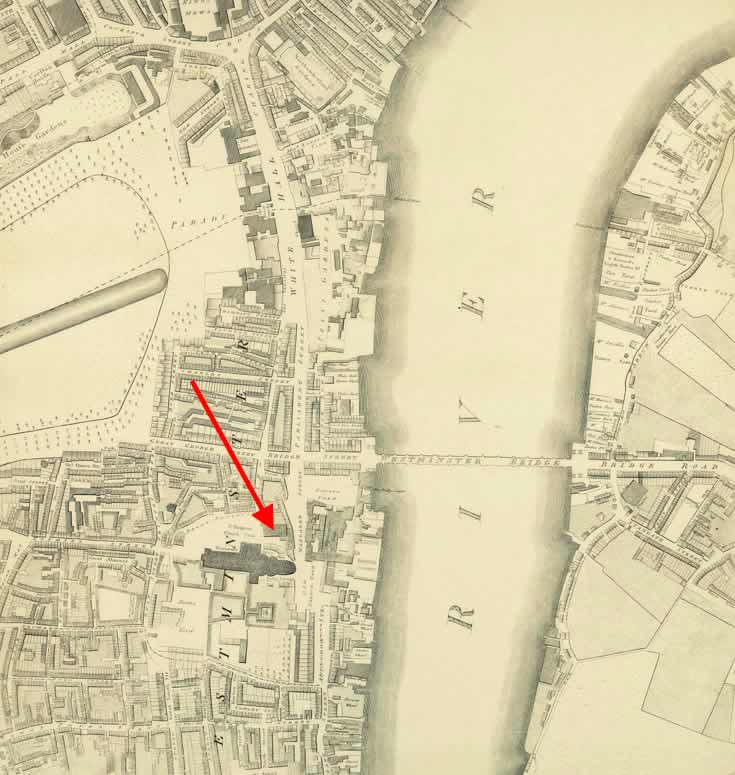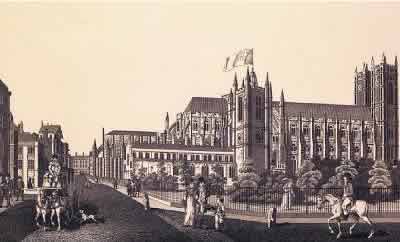28 May 1818: George Marries, Hunt Attacked, Keats Cringes, Hazlitt Influences
St. Margaret’s Church, Westminster, London


Where Keats’s younger brother, George, marries Georgiana Wylie, 28 May 1818.
Keats, aged 22, signs the marriage register as witness. Keats, however, is not totally
joyful, since the marriage signals the emigration of his brother and sister-in-law
to the
United States. George’s reasons for going are wrapped around opportunities: to make
some kind
of living and to acquire property. In a way, this is a moment of minor reckoning:
as Keats
admits about a year later, My Brother George always stood between me and any dealings with
the world—Now I find I must buffet it
(31 May 1819). The company of his siblings has
always propped him up, which is not surprising given that his father died in 1804,
his mother
in 1810, and his greatly esteemed maternal grandmother in 1814. But now, he’s going
to have
dealings with the world
that may, in a way, force and fashion his responsibilities
and independence.
But, through Georgiana, Keats has at least come to know and greatly respect her family of origin, the Wylies, and he will continue in his friendship with them.

Worth noting: with George about to leave, with his other younger brother (Tom) sick and sliding toward death, and with his younger sister (Fanny) almost sequestered from him by the family trustee, Richard Abbey, Keats must be experiencing feelings of loss—this, despite his supportive friends and often hectic socializing. Keats has no real job, and no exact prospects. Neither does he have a clear idea of what family money he actually has: given Abbey’s obdurate management style, Keats is largely in the dark about his slippery and slipping finances. During May, Keats expresses moments of unease and depression, despite making progress in his thinking about poetry. Facing loss perhaps makes him face other forms—poetic forms—of gain.
By this time, Keats has likely seen the anonymous review of Leigh Hunt’s collection of poetry, Foliage—Letter from Z. To Mr. Leigh Hunt, King of the
Cockneys—in the May edition of Blackwood’s Edinburgh
Magazine, written by Z
—John Gibson
Lockhart. The Letter attacks Hunt’s plebeian
origins and education
as well has is liberal politics, gross vanity, and mainly
ineffectual poetry. There’s no holding back in these Regency culture wars.
Hunt is the target of Z’s Letter, but Keats is
mentioned—first, as the amiable but infatuated bardling, Mister John Keats,
and then as
the person who, with a delicate hand,
crowns Hunt with a laurel. Z has in mind the
sonnet Hunt addresses to Keats in Foliage. Hunt suggests that
Keats, as his protégé, is likewise destined for poetic fame. These sentiments and
barely
closeted egotism are easy marks for ridicule, especially because of the laurel-crowning
poems,
which picture Hunt and Keats placing the wreaths on themselves. (In fact, in another
of Hunt’s
poems in the collection, which is full of poems to and about his circle of friends,
he once
more pictures his wing-sprouting poet-self crowned with a laurel—Fancy’s Party.
) In
referring back to these poems, the October 1819 Blackwood’s
couples Hunt and Keats and nominates them as a pair of blockheads
(p.75). Keats is
aware of how publicly embarrassing the laurel-crowning scene is in Hunt’s poems, and
next
month, 10 June, he writes, a little playfully, I have more than a Laurel from the Quarterly
Reviewers for they have smothered me in Foliage.
In truth, Hunt’s laurel poems are
unblushingly self-centered and propped by indulgent poeticisms. Again, he makes himself
an
easy target, even without any ideological motivations for slamming him.
Keats’s public association with Hunt begins
earlier. In a way, Keats himself signals the connection by dedicating his first volume
of
poems (1817) to Hunt, and by being published in Hunt’s progressive and often controversial
journal, The Examiner. Then, in October 1817, comes the very
first of Blackwood’s attacks on Hunt: On the Cockney
School of Poetry
opens by citing Keats as a son of promise
from a poem by Cornelius Webbe. Keats is sure he is next up for full
ridicule (3 Nov 1817). Even letters to the editor of the relatively obscure newspaper,
the
Anti-Gallican Monitor of 8 June 1817, after suggesting
that Keats be suspended to Bedlam
because of his poetry, ends by saying Keats’s work is
mainly an echo of Mr. Hunt’s; his style in every respect.
And so it does not take Keats
long to both regret and reconsider aspects of his association with Hunt, and not just
because
it makes him easy fodder for the culture wars. But a side of the association with
Hunt
actually aids Keats in his poetic progress: in cringing over his perceived affinity
with
Hunt’s style
of poetry, Keats in 1818 begins to avoid writing poetry that whiffs of
Hunt’s phraseology and comfy suburban posturing, what Z in the October 1819 Blackwood’s calls Hunt’s characteristic Love of sociality
(pp.71-73). Thus poetic independence becomes a stated primary drive for Keats: he
will take
his own direction and not worry about what others say about him. He wants, as it were,
to be
his own master, and not Hunt’s apprentice. He desires deeper prospects rather than
suburban
signature that overwrites much of his early poetry.
And so this month Keats profitably wrestles with ideas about knowledge, imagination,
and
poetic genius that both propel and anticipate his poetic progress. In his 3 May letter
to
John Hamilton Reynolds, Keats theorizes that
both knowledge and poetic strength require a form of speculative knowledge that, fearlessly,
looks beyond and through uncertainty, mystery, and mutability. Keats gets to this
point partly
by gauging the difference between Milton and
Wordsworth. In particular, Keats observes
how Wordsworth explores the burden of the mystery
(so named in Wordsworth’s Tintern Abbey, line 38) and how he thinks
through human
suffering and into the human heart.
This takes us to Keats’s developing ideas—and their
origins—some of which he hints at toward the end of the month.
On 25 May in a letter to his good friend Benjamin
Bailey—in which a noteworthy element is Keats’s description of his depressed,
uninspired, and degenerating state
—Keats mentions William Hazlitt’s recent lectures on the English poets, just put
out by Keats’s own publishers, Taylor & Hessey. Keats in fact has just dined with Hazlitt,
and he attends some of Hazlitt’s popular Surrey Institution lectures earlier in the
year. In
hindsight, what is particularly striking but often ignored is that core features of
Keats’s
remarkable poetics derive directly from Hazlitt’s ideas about the nature of Shakespeare’s genius as described in his third lecture, On Shakespeare and Milton. Shakespeare’s mind, Hazlitt observes,
has no peculiar bias
—He was least of an egotist that it was possible to be. He was
nothing in himself; but he was all that others were, or that they could become. [.
. .] His
genius shone equally on the evil and on the good, on the wise and the foolish, the
monarch
and the beggar.
Shakespeare had only to think of anything to become that thing
;
he could instantly enter and become whatever subject or character he conceived, being
able to
pass from one to another.
Like a ventriloquist, he throws his imagination out of
himself.
Keats obviously echoes and channels these ideas (and the critical lexicon) later in
the year
when he is on the verge of producing his own great poetry. He does so to Richard Woodhouse on 27 October in what amounts to his
principle statement about the poetical Character.
Keats writes that the poetic type he
aspires to in fact has no character—it enjoys light and shade; it lives in gusto, be it
foul or fair, high or low, rich or poor, mean or elevated—It has as much delight in
conceiving an Iago as an Imogen. [. . .] he has no identity—he is continually in for—and
filling some other Body— [. . .] he has no self.
Keats here famously calls this the
camelion Poet,
as distinguished from the wordsworthian or egotistical sublime,
but no doubt it is inspired by Hazlitt’s thoughts on Shakespeare’s plastic
imaginative powers. Using
Hazlitt’s terms, Keats aims to write poetry without bias
and egotism. It turns out he
aims well.

